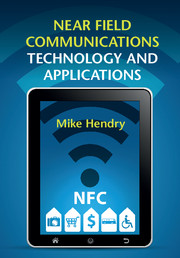Book contents
- Frontmatter
- Contents
- Part I Introduction
- Part II Technology
- 3 Standards
- 4 Modes of operation
- 5 RF requirements and components
- 6 The Secure Element
- 7 Tags and terminals
- 8 NFC apps
- 9 Infrastructure requirements
- 10 Security
- 11 Interoperability
- Part III Applications
- Part IV Implementation
- Appendix A Glossary
- Appendix B Standards
- Index
- References
5 - RF requirements and components
from Part II - Technology
Published online by Cambridge University Press: 05 December 2014
- Frontmatter
- Contents
- Part I Introduction
- Part II Technology
- 3 Standards
- 4 Modes of operation
- 5 RF requirements and components
- 6 The Secure Element
- 7 Tags and terminals
- 8 NFC apps
- 9 Infrastructure requirements
- 10 Security
- 11 Interoperability
- Part III Applications
- Part IV Implementation
- Appendix A Glossary
- Appendix B Standards
- Index
- References
Summary
Frequencies and data rates
All NFC devices operate at a single frequency of 13.56 MHz ± 7 kHz. This is one of the frequency bands designated internationally for Industrial, Scientific or Medical (ISM) use, in most cases with no licensing restrictions provided that receivers must be able to tolerate interference from other devices operating in this band and readers must not generate a field in excess of 42 dB μA/m at 10m.
The data-rates (bit-rates) available are derived from this frequency fc by dividing it by 2n: most commonly fc/128, which equates to 105.93 kbps, normally taken as 106 kbps. In some modes the active device may select a higher bit-rate, either 212 or 424 kbps; when in peer-to-peer mode all devices must be capable of operating at 106, 212 or 424 kbps, but card emulation or reader–writer operations will normally take place at 106 or 212 kbps according to the capability of the tag or card type.
- Type
- Chapter
- Information
- Near Field Communications Technology and Applications , pp. 47 - 57Publisher: Cambridge University PressPrint publication year: 2014

